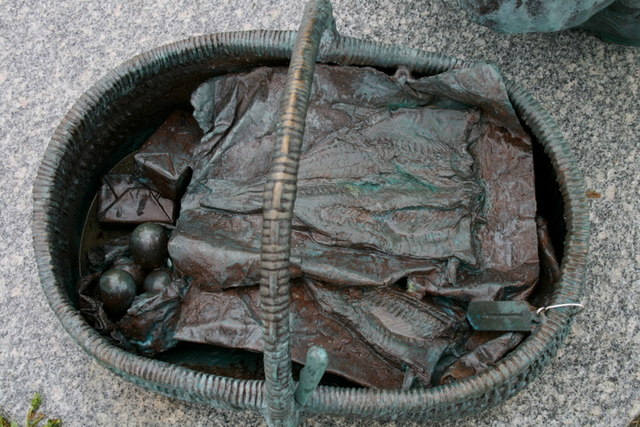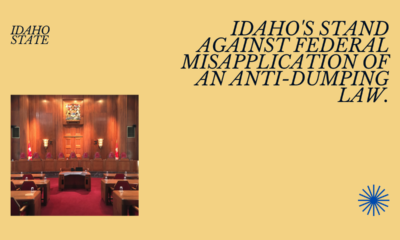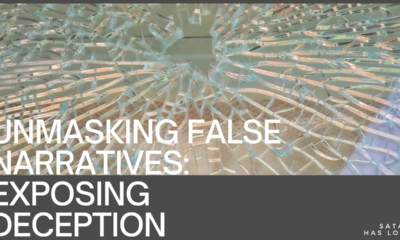Let's Talk
News as entertainment
When did the news become like entertainment? When has the news NOT been entertainment? It always was, from the invention of newspapers in ancient Rome.

Again from a social medium that shall remain nameless, someone asked, “When did the news cease to be like news and become more like entertainment?” A question like that presupposes that a time existed when the news was not like entertainment. But in fact the news has likely been “like entertainment” since the very inception of reportable news. That inception, in turn, happened in ancient Rome, with the publication of the very first newspaper. Its title: Acta Diurna Senatus Romani, or The Roman Senate Journal. Editor-in-chief: Gaius Julius Caesar, in his role as senior consul. It consisted of the minutes of open-door sessions of the Senate of Rome.
Furthermore, broadcast news was always a form of entertainment. That has been a fact, to paraphrase the late Actor Warren Oates, “since Marconi invented the thing!”
News as entertainment – real life and the movies – what was the difference?
H. V. Kaltenborn famously demonstrated this blend of news with entertainment when he appeared, as himself, in Mister Smith Goes to Washington (Columbia Pictures, 1939). When James Stewart, as Sen. Jefferson Smith (D-Colo.), did The Filibuster, Kaltenborn, without one hint of irony, set the stage. And he set it almost as if he were a circus ringmaster. Had an actual Senator held the floor in a desperate bid against expulsion, Kaltenborn would have covered it the same way.
Then you have Edward R. Murrow, who, with his See It Now program, could turn whole pictures inside out at his discretion. And he did, too. Ask Senator Joseph McCarthy of Wisconsin, or anyone else who still sympathizes with him. Whatever one thinks of McCarthy, his message, or his methods, one cannot deny that Edward R. Murrow destroyed him in a manner that strayed far from a dry recital of news.
Entertainment pretending to be news – the Mercury Theater War of the Worlds broadcast
And what shall we say of the Mercury Theater and their dramatization of The War of the Worlds, in 1938?
They presented as explicit entertainment a set of news reports that would have played out exactly the same way, had the events been real. Why do you think it threw so many listeners into a panic? I wasn’t alive then, but I have this oral history from my late mother, who heard the broadcast live. The whole family gathered for the presentation, and started it on schedule. So they knew what they were listening to, and that it wasn’t real. But Orson Welles gave so few hints during the broadcast that it certainly sounded real enough.
That’s when my grandfather, or so my mother told me, said,
You watch. Any minute now, a bunch of our neighbors are going to come knocking on our door, and…
POUND, POUND, POUND, POUND, POUND, POUND, POUND!
Sure enough, when he opened the door, …
We’re going to die together! WE’RE GOING TO DIE TOGETHER!
And my grandfather would tell these frantic door knockers,
Calm down, you people! Don’t you realize that this is a radio play? Did any of you try changing the channel? If you had, you would have known that this is playing only on this channel!
Or words to similar effect.
Broadcasting in the Sixties
Indeed, Orson Welles understood what William Randolph Hearst on one hand, and Arthur L. Ochs on the other, carefully hid. Which is: that the presentation of news is always a form of entertainment. And not entertainment only, but also propaganda. Hearst did not answer Welles with what became their Pyrrhic war, merely because Welles “outed” Hearst’ mistress! Welles also “outed” the boast of editors-in-chief everywhere:
I tell the people what to think.
Nor did this blur stop with newspapers or with radio. Remember the great television news stars of the Sixties and Seventies: Walter Cronkite, John Chancellor, Howard K. Smith, Harry Reasoner – and Mike Wallace, Morley Safer, and Dan Rather. Most delivered the news in a deadpan way – in fact, Walter Cronkite delivered the news straight from the working newsroom, where you could see the monitors on a table beside his anchor chair. All nice and official, all designed to engender trust. And so nobody caught it when Cronkite totally misrepresented the Tet Offensive as a North Vietnamese Army victory.
Dan Rather, however, introduced the dramatic in his presentation. He covered Hurricane Carla, in 1963, thus:
And who can forget his performance on the floor of the Democratic National Convention in Chicago in 1968? When security guards belted him and knocked him to the floor, they gave him all the dramatic license he needed.
And all the license Walter Cronkite needed, too.
I think we’ve got a bunch of thugs here, Dan!
War of the Worlds redux?
John Chancellor and Howard K. Smith lent their broadcast news personae to the NBC television mini-series and series, V (1983). Chancellor appeared early in the original miniseries, covering the arrival of the flying serving platters bearing the Visitors. Then when V became an hour-long series, Smith would introduce every episode with a segment on “the state of the war tonight.” That those two could bring it off, should tell you that the presentation of news is a form of entertainment. Not to mention the character of Kristine Walsh, who became the Visitors’ press secretary – and then gave her life in a moment of which CNAV dares say most television reporters secretly dream.
Ladies and gentlemen, you have just seen a terrorist attack on the [Los Angeles Medical Center]. But it wasn’t terrorism. It was resistance – resistance against the monsters who are trying to take over this planet. You have seen them as they really are – reptiles! They must be fought! They must be defeated! AHHHHHHhhhhh … !
News as entertainment – from 1985 to today
Now one can say that, starting in the Eighties and the Nineties, you got more channels, and some of the channels tried a few come-ons to get people to change. But mostly you got the conservative take on the news, and the liberal take on the news. And the two were not the same. It would be left to citizen journalists to tell us who was telling the truth, and who was lying.
One new network at least pretended in the beginning to give the news “straight” : the Cable News Network. Then, perhaps with the election of Barack H. Obama, they dropped all pretense. Scandal is bringing that network down today – but not the scandal of sexual abuse of children. That’s happening, too, but mainly we see the scandal of a network that has lied in delivering the news. Now viewers know it.
All that to say: we’ve been tuned in to the Mercury Theater, or its equivalent, for nearly a century. Only when they started to get serious, non-mirror competition did we even notice that more than one version of facts and events were available. And now we have a choice, which some of us are making after critical examination. Sadly, the rest of us are making that choice from often twisted wishes and desires. These desires cover not merely how to present the news – but how to write it. This in turn derives from wishes and desires about what kind of society we wish to live in.
Terry A. Hurlbut has been a student of politics, philosophy, and science for more than 35 years. He is a graduate of Yale College and has served as a physician-level laboratory administrator in a 250-bed community hospital. He also is a serious student of the Bible, is conversant in its two primary original languages, and has followed the creation-science movement closely since 1993.
-

 Human Interest4 days ago
Human Interest4 days agoIdaho prepares to defend its abortion ban
-

 Education2 days ago
Education2 days ago‘Grading for Equity’: Promoting Students by Banning Grades of Zero and Leaving No Class Cut-Ups Behind
-

 Civilization4 days ago
Civilization4 days agoEarth Day Should Celebrate U.S. Progress & Innovation
-

 Civilization3 days ago
Civilization3 days agoNewsom plays silly abortion politics
-

 Family1 day ago
Family1 day agoIdaho defends against abortion mandate
-

 Education4 days ago
Education4 days agoThe Intifada Comes to America. Now What?
-

 Civilization4 days ago
Civilization4 days agoEarth Day – part of cultural Marxism
-

 Civilization3 days ago
Civilization3 days agoWaste of the Day: China Still Owes Over $1 Trillion to American Bondholders














